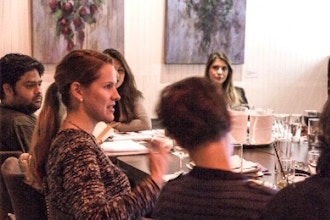Society and the Spirit of Capitalism: an Introduction
- Beginner
- 21 and older
- $315
- Earn 3,150 reward points
- Online Classroom
- 12 hours over 4 sessions
Thankfully we have 7 other Lecture Classes for you to choose from. Check our top choices below or see all classes for more options.
Brooklyn Institute for Social Research @ Online Classroom
Delve into the transformative insights of Saidiya Hartman's groundbreaking works on Black life and history. Join us as we explore Hartman's profound reimagining of freedom, agency, and the legacy of the Atlantic slave trade.
Apr 29th
6:30–9:30pm EDT
Meets 4 Times
Brooklyn Institute for Social Research @ Online Classroom
Embark on a riveting exploration of trust, deceit, and existential uncertainty in Herman Melville’s masterpiece. Join us as we dissect The Confidence-Man, delving into its satire of capitalist modernity and probing questions of faith, knowledge, and societal norms.
May 5th
2–5pm EDT
Meets 4 Times
Brooklyn Institute for Social Research @ Online Classroom
Delve into the profound intersections of race, class, and capitalism in a thought-provoking exploration of contemporary radical movements. Join us for an in-depth examination of Cedric Robinson’s concept of racial capitalism and its implications for understanding modernity, nationalism, and Black Radicalism.
May 7th
6:30–9:30pm EDT
Meets 4 Times
Brooklyn Institute for Social Research @ Online Classroom
Embark on a captivating exploration of Mesopotamian civilization through archaeology and material culture. Join us as we delve into the origins, structures, and legacy of this ancient society, unraveling its significance amidst historical interpretations and contemporary geopolitical contexts.
May 8th
6:30–9:30pm EDT
Meets 4 Times
Brooklyn Institute for Social Research @ Online Classroom
Uncover the entwined history of psychoanalysis and state power in a captivating exploration of repression tactics. Join us as we delve into the intersections of Freudian theory with military strategy, urban policing, and guerrilla warfare.
May 12th
2–5pm EDT
Meets 4 Times
Society and the Spirit of Capitalism: an Introduction to Max Weber
Max Weber sought to explain nothing less than the emergence of the modern world and the direction in which it was headed. A trailblazer (along with Karl Marx and Emile Durkheim) of the modern discipline of sociology, Weber brought to bear empirically driven methods of comparative analysis to identify and analyze the individual attitudes and social structures that shape and determine collective life. His work ranges from the study of ancient Mediterranean civilizations to Chinese religion to the emergence of “rationality” and bureaucracy to, perhaps most famously, the “elective affinity” between capitalism and Protestant Christianity. Reading Weber, we’re confronted with questions that are as pressing today as they were when Weber wrote: What is the nature of the modern world, and how did it emerge? What is the meaning of freedom in a bureaucratic and economistic society? Are we locked in an “iron cage”—one in which we’re relentlessly driven, automaton-like, to accumulate and produce? And, how can we find meaning in an individualistic world of material plenty, in which the loosening of social bonds appears to be a necessary condition for economic productivity and the accumulation of wealth?
In this course, an introduction to the major work, ideas, and methods of Max Weber, we will closely read Weber’s classic The Protestant Ethic and the Spirit of Capitalism, using it as a basis for exploring many of the central themes of Weber’s thought: the rise of modern capitalism, the multidimensionality of power in societies, the theory of social action, ideal types, the dilemmas of modernity, and the objectivity of knowledge. As we go, we’ll also read from Weber’s other well-known works, including selections from his magnum opus Economy and Society, his essays on bureaucracy, and his famous “Vocation” lectures. As we go, we will ask: what is the nature of the state? How for Weber is politics a sphere distinct and separate from other social activities? How can we understand charisma today as a force in modern life, one that cuts through bureaucratic forms to potentially destabilize the settled political order? What is the role of scientists in moments of political conflict? And finally, how closely does the world Weber attempted to describe—of increasing rationality and order in social and political life—resemble the fractious, crisis-ridden world in which we live today? In addition to works by Weber, we may discuss the insights of some of his most famous interpreters and critics, such as Talcott Parsons, C. Wright Mills, Anthony Giddens, and Raymond Aron.
This course is available for "remote" learning and will be available to anyone with access to an internet device with a microphone (this includes most models of computers, tablets). Classes will take place with a "Live" instructor at the date/times listed below.
Upon registration, the instructor will send along additional information about how to log-on and participate in the class.
In any event where a customer wants to cancel their enrollment and is eligible for a full refund, a 5% processing fee will be deducted from the refund amount.

People who viewed this class also viewed the following classes
Get quick answers from CourseHorse and past students.
The Brooklyn Institute for Social Research was established in 2011 in Boerum Hill, Brooklyn. Its mission is to extend liberal arts education and research far beyond the borders of the traditional university, supporting community education needs and opening up new possibilities for scholarship in the...
Read more about Brooklyn Institute for Social Research

This school has been carefully vetted by CourseHorse and is a verified Online educator.

Booking this class for a group? Find great private group events



More in Life Skills




Get special date and rate options for your group. Submit the form below and we'll get back to you within 2 business hours with pricing and availability.